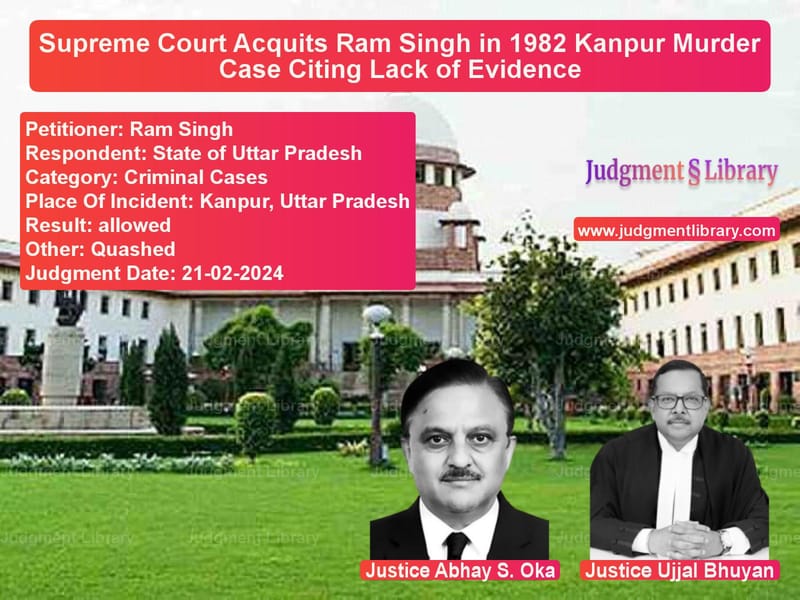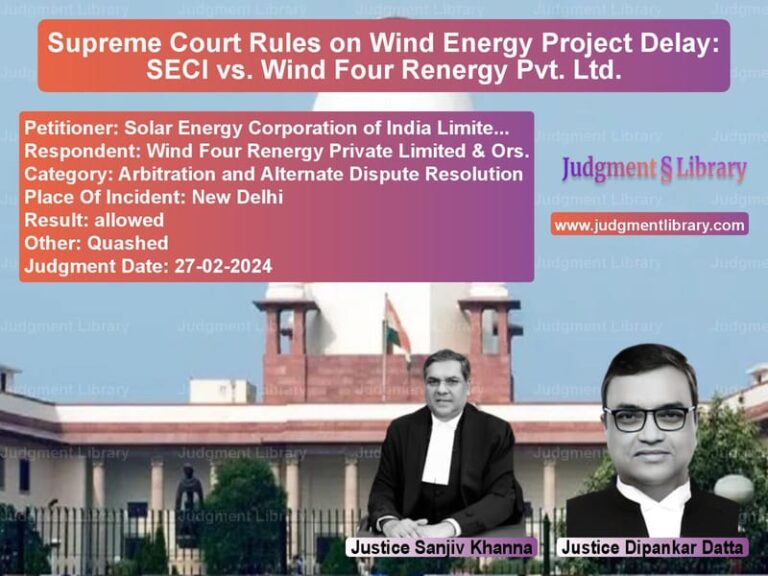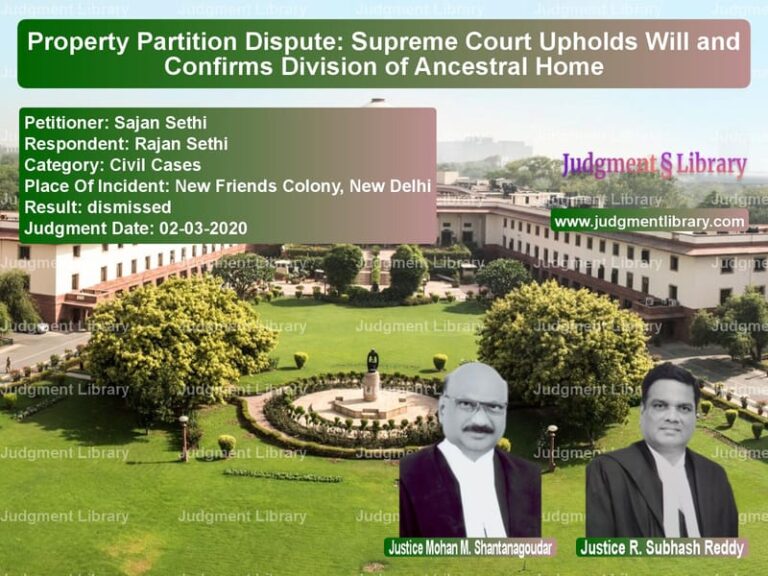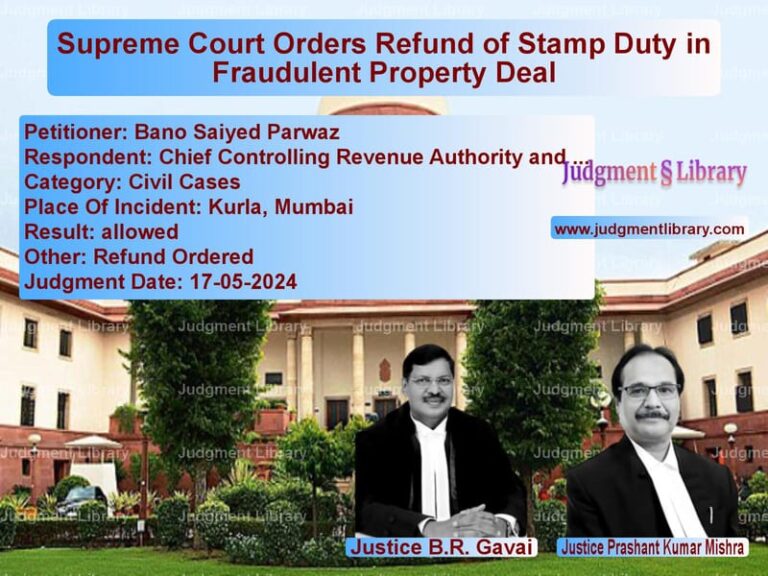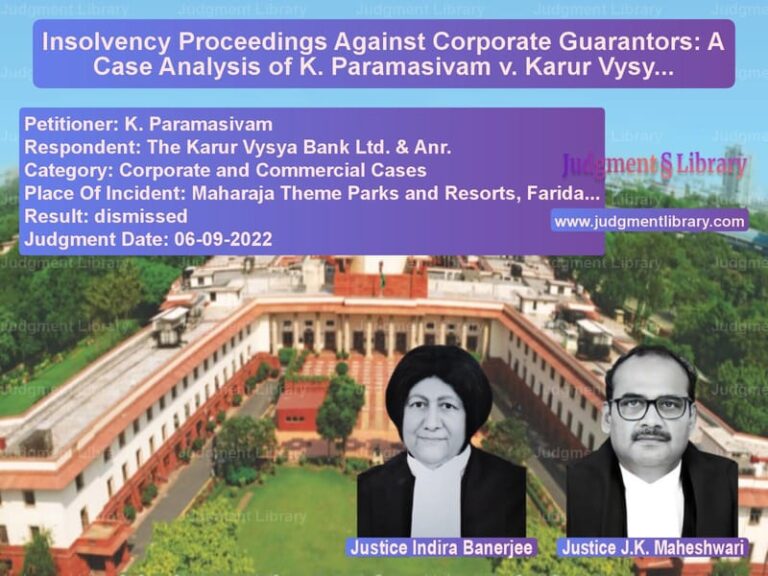Supreme Court Acquits Ram Singh in 1982 Kanpur Murder Case Citing Lack of Evidence
The Supreme Court of India has acquitted Ram Singh in the 1982 Kanpur murder case, overturning the Allahabad High Court’s decision that upheld his conviction under Sections 301 and 302 of the Indian Penal Code (IPC). The Court found serious inconsistencies in the prosecution’s evidence, lack of crucial witness testimony, and the absence of a forensic link between the crime and the alleged weapon. The ruling highlights the importance of proving guilt beyond reasonable doubt and reinforces the principle that an accused must be given the benefit of doubt if evidence does not conclusively establish guilt.
Background of the Case
Ram Singh was convicted for the murder of Dulli, the mother of the complainant Radhey Lal, on August 19, 1982. The prosecution alleged that Singh, accompanied by an accomplice named Lala Ram, fired a shot at Radhey Lal but missed, striking Dulli instead. The prosecution’s case relied heavily on eyewitness testimony and circumstantial evidence. The trial court convicted Ram Singh, sentencing him to life imprisonment under Section 301 read with Section 302 IPC and five years under Section 307 IPC. His appeal before the Allahabad High Court was dismissed in 2018, leading to this appeal before the Supreme Court.
Prosecution’s Case
According to the first information report (FIR) lodged by Radhey Lal, he and his brother Desh Raj were sitting outside their home in Kanpur at around 8:00 PM, along with their mother, Dulli, and neighbors Lala Ram and Man Singh. The accused, Ram Singh, allegedly arrived with Lala Ram and, upon being instigated by Lala Ram, fired at Radhey Lal. However, Radhey Lal ducked, and the bullet struck his mother, killing her instantly. The accused then fled the scene.
The police filed a charge sheet against Ram Singh under Sections 301 and 302 IPC, along with Section 307/34 IPC, while the co-accused Lala Ram was acquitted due to lack of sufficient evidence.
Arguments by the Appellant (Ram Singh)
- The alleged eyewitnesses were not reliable as they had personal enmity with the appellant.
- Material inconsistencies in witness testimonies raised serious doubts about their credibility.
- The firearm allegedly used in the crime was never recovered, and no ballistic examination was conducted.
- Key witnesses, such as Radhey Lal’s brother Desh Raj, were never examined by the prosecution.
- The trial court acquitted the co-accused Lala Ram based on the same evidence used to convict Ram Singh.
- There was a prior political rivalry between Radhey Lal and the accused due to the village Pradhan elections, suggesting a possible motive for false implication.
Arguments by the Respondent (State of Uttar Pradesh)
- Eyewitnesses placed Ram Singh at the crime scene and identified him as the shooter.
- The absence of a recovered firearm did not diminish the credibility of the eyewitness testimonies.
- The post-mortem report confirmed that Dulli died from a gunshot wound.
- The conviction was based on substantial evidence and the testimonies of multiple witnesses.
Supreme Court’s Observations
1. Inconsistencies in Witness Testimonies
The Court found significant contradictions in the statements of key witnesses regarding where they were sitting, how the shot was fired, and their actions immediately after the incident. These inconsistencies cast doubt on the reliability of their testimonies.
2. Failure to Examine Crucial Witnesses
The prosecution failed to examine Desh Raj, who was allegedly present during the incident. The Court ruled that this omission weakened the case, as his testimony could have provided clarity on crucial aspects.
3. Lack of Forensic Evidence
The police failed to recover the firearm allegedly used in the crime, and no ballistic examination was conducted on the bullet recovered from the deceased. This lack of forensic linkage between the accused and the weapon further weakened the prosecution’s case.
4. No Justification for Acquitting Co-Accused While Convicting Ram Singh
The trial court had acquitted co-accused Lala Ram while convicting Ram Singh, despite both being accused based on the same evidence. The Supreme Court held that this selective conviction was unjustified.
5. Benefit of Doubt Must Be Given
The Court reiterated the legal principle that if an accused’s guilt is not proven beyond reasonable doubt, he must be given the benefit of doubt. Given the contradictions and missing evidence in this case, the Court found it inappropriate to uphold the conviction.
Final Judgment
- The Supreme Court overturned the conviction of Ram Singh.
- The sentences imposed by the trial court and upheld by the High Court were set aside.
- Ram Singh was ordered to be released immediately unless required in any other case.
Legal and Social Implications
1. Strengthening the Standard of Proof
This ruling reinforces that criminal convictions must be based on strong and conclusive evidence. Courts must ensure that the standard of proof beyond reasonable doubt is met before convicting an accused.
2. Importance of Forensic Evidence
The case highlights the necessity of ballistic examination and forensic evidence in firearm-related offenses. The absence of a recovered weapon should not be overlooked in serious criminal trials.
3. Fairness in Acquitting or Convicting Multiple Accused
The judgment underscores that if two accused face similar charges based on identical evidence, convicting one while acquitting the other is legally unsound.
4. Protection Against False Implications
The ruling serves as a safeguard against wrongful convictions based on personal enmity or political rivalry.
Conclusion
The Supreme Court’s decision in this case reiterates the fundamental principle of criminal law—that an accused must be convicted only if guilt is proven beyond a reasonable doubt. The Court’s detailed analysis of inconsistencies in witness statements, failure to examine key witnesses, and lack of forensic evidence ultimately led to the acquittal of Ram Singh. This judgment sets an important precedent for ensuring fair trials and preventing miscarriages of justice.
Petitioner Name: Ram Singh.Respondent Name: State of Uttar Pradesh.Judgment By: Justice Abhay S. Oka, Justice Ujjal Bhuyan.Place Of Incident: Kanpur, Uttar Pradesh.Judgment Date: 21-02-2024.
Don’t miss out on the full details! Download the complete judgment in PDF format below and gain valuable insights instantly!
Download Judgment: ram-singh-vs-state-of-uttar-prade-supreme-court-of-india-judgment-dated-21-02-2024.pdf
Directly Download Judgment: Directly download this Judgment
See all petitions in Murder Cases
See all petitions in Bail and Anticipatory Bail
See all petitions in Judgment by Abhay S. Oka
See all petitions in Judgment by Ujjal Bhuyan
See all petitions in allowed
See all petitions in Quashed
See all petitions in supreme court of India judgments February 2024
See all petitions in 2024 judgments
See all posts in Criminal Cases Category
See all allowed petitions in Criminal Cases Category
See all Dismissed petitions in Criminal Cases Category
See all partially allowed petitions in Criminal Cases Category

